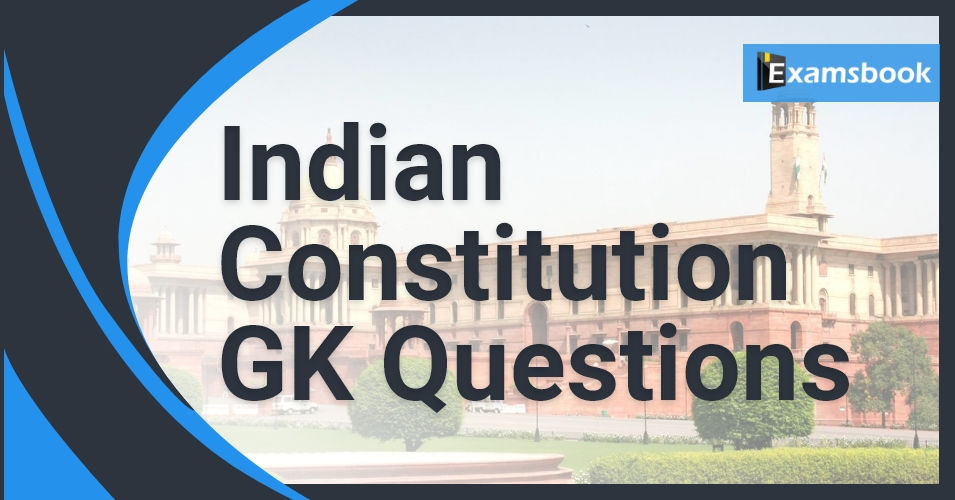Indian Constitution Questions and Answers for Competitive Exams

Constitution Quiz Questions
Which Part of the Constitution of India deals with citizenship?
(A) Part 6
(B) Part 3
(C) Part 2
(D) Part 5
Correct Answer : C
Explanation :
1. Part II of the Constitution of India deals with citizenship. This part consists of Articles 5 to 11.
2. There are two types of people in India – citizens and foreigners.
3. Citizens are full members of the Indian State and owe allegiance to it.
Part ______ of the Constitution of India deals with the amendment of the Constitution.
(A) 18
(B) 13
(C) 20
(D) 10
Correct Answer : C
Explanation :
1. Part 20 of the Indian Constitution deals with the amendment process of the Constitution.
2. Part XX contains only one article i.e. Article 368 which deals with amendment of the Constitution.
Which of the following is not included in the obligation of the public authority as per Section 4 of the Right to Information Act 2005?
(A) To publish the particulars, functions and duties of its organization within 120 days.
(B) Updating published information every month.
(C) Duly indexing all records so as to facilitate the exercise of this right.
(D) Ensure that all records are computerised.
Correct Answer : B
Explanation :
According to Section 4 of the Right to Information Act, 2005, the public authority has the right obligations.
(1) To publish the particulars, functions and duties of its organization within 120 days.
(2) Duly indexing all records so as to facilitate the exercise of this right.
(3) Ensure that all records are computerised.
Which part of the Constitution of India consists of the idea of a Welfare State?
(A) Directive Principles of State Policy
(B) Fundamental Duties
(C) Fundamental Rights
(D) Preamble
Correct Answer : A
Explanation :
1. Welfare state is a concept of government in which the state plays a vital role in protecting and promoting the economic and social well-being of its citizens.
2. Part IV of the Indian Constitution deals with the Directive Principles of State Policy.
3. The Directive Principles of State Policy constitute a comprehensive socio-economic program for a modern democratic state.
In which of the following year the Fundamental Duties were inserted in the Constitution?
(A) 1975
(B) 1978
(C) 1976
(D) 1980
Correct Answer : C
Explanation :
The Fundamental Duties of citizens was added to the Constitution by the 42nd Amendment in 1976, upon the recommendations of the Swaran Singh Committee that was constituted by the government earlier that year.
Which article of the Constitution says that the Counsel of States (Rajya Sabha) shall not be dissolute?
(A) Article 83
(B) Article 53
(C) Article 80
(D) Article 154
Correct Answer : A
Explanation :
Article 83 : Duration of Houses of Parliament
(1) The Council of States shall not be subject to dissolution, but as nearly as possible one-third of the members thereof shall retire as soon as may be on the expiration of every second year in accordance with the provisions made in that behalf by Parliament by law.
Which one of the Directive Principles of State Policy deals with the promotion of international peace and security?
(A) Article 32
(B) Article 67
(C) Article 51
(D) Article 55
Correct Answer : C
Explanation :
Article 51 of the Constitution which is a Directive Principle of State Policy directs the state to promote international peace and security and maintain just and honorable relations between nations.
In which case did the Supreme Court propound the principle of the basic structure of the constitution?
(A) Balwant Rai Mehta Vs. State of Punjab
(B) Ashok Mehta vs. State of Kerala
(C) Kesavananda Bharati Vs. State of Kerala
(D) None of these
Correct Answer : C
Explanation :
It was the Kesavananda Bharati case that brought this doctrine into the limelight. It held that the “basic structure of the Indian Constitution could not be abrogated even by a constitutional amendment”. The judgement listed some basic structures of the constitution as: Supremacy of the Constitution.
When was Bhimrao Ambedkar, the architect of the Constitution of India, born?
(A) 12 January
(B) 18 February
(C) 14 April
(D) 23 January
Correct Answer : C
Explanation :
Bhimrao Ramji Ambedkar (14 April 1891 – 6 December 1956) was an Indian jurist, economist, social reformer and political leader who headed the committee ...
Which Constitutional Amendment Act An authoritative text of the Constitution in Hindi was provided to the people of India by the President in?
(A) 57th Constitutional Amendment Act, 1987
(B) 58th Constitutional Amendment Act, 1987
(C) 59th Constitutional Amendment Act, 1988
(D) 61st Constitutional Amendment Act, 1988
Correct Answer : B
Explanation :
58th Constitutional Amendment Act, 1987 of the Indian Constitution deals with the provision for an authoritative text of the Constitution in the Hindi language. It gave the same legal sanctity to the Hindi version of the Constitution.



